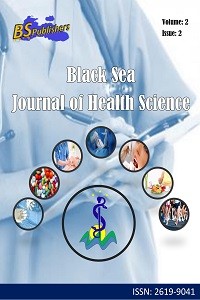Öz
İnsan ısırıkları, köpek ve
kedi ısırıklarından sonra en sık görülen üçüncü ısırık tipidir. İnsan ağız
florasında yüksek miktarda bulunan bakteriler, küçük bir ısırık yarasını tedavi
etmesi güç ciddi infeksiyona dönüştürebilir ve komplikasyonlar gelişebilir. Bu
vaka sunumunda, bir hafta önce kızı tarafından sol el sırtından ısırılma
sonrası elde şiddetli ağrı ile hastanemize başvuran Staphylococcus aureus’un etken olduğu nekrotizan fasiit olgusu
sunulmuştur.
Anahtar Kelimeler
Kaynakça
- Aziz H, Rhee P, Pandit V, Tang A, Gries L, Joseph B. 2015. The current concepts in management of animal (dog, cat, snake, scorpion) and human bite wounds. J Trauma Acute Care Surg,78(3): 641-648.
- Doğanay M, Demiraslan H. 2017. Deri ve Deri Altı Dokusunun Bakteriyel İnfeksiyonları. In: Willke Topçu A, Söyletir G, Doğanay M, eds. İnfeksiyon Hastalıkları ve Mikrobiyolojisi. 4. Baskı. İstanbul: Nobel Tıp Kitabevleri; p. 1162-1167.
- Goldstein EJC. 2010. Bites. In: Mandell GL, Bennett JE, Dolin R eds. Mandell, Douglas, and Bennett’s Principles and practice of Infectious Diseases. 7th ed. Philadelphia: Churchill Livingstone:p. 3911-3915.
- Griego RD, Rosen T, Orengo IF, Wolf JE. 1995. Dog, cat, and human bites: A review. J Am Acad Dermatol, 33: 1019–1029.
- Hosek WT, Laeger TC. 2009. Early diagnosis of necrotizing fasciitis with soft tissue ultrasound. Acad Emerg Med, 16:1033.
- Patil PD, Panchabhai TS, Galwankar SC. 2009. Managing human bites.J Emerg Trauma Shock, 2(3): 186-190.
- Pasternack MS, Swartz Mn. 2010. Cellulitis, Necrotizing Fasciitis and Subcutaneous Tissue Infections. In: Mandell GL, Bennett JE, Dolin R, eds. Mandell, Douglas, and Bennett’s Principles and practice of Infectious Diseases 7th ed. Philadelphia: Churchill Livingstone; p. 1289-1310.
- Pretty IA. 2008. Forensic dentistry: 2. Bite Marks and bite injuries. Dent Update, 35: 48-61.
- Sikora CA, Spielman J, MacDonald K, Tyrrell GJ, Embil JM. 2005. Necrotizing fasciitis resulting from human bites: A report of two cases of disease caused by group A streptococcus. Can Jof İnfect Dis Med Microbiol, 16(4): 221-224.
- Uluğ M. 2012. Necrotizing fasciitis resulting from human bite: A case report of disease caused by Sphingomonas paucimobilis. Flora Derg,17: 187-191.
- Wong CH, Khin LW, Heng KS, Tan KC, Low CO. 2004. The LRINEC (Laboratory Risk Indicator for Necrotizing Fasciitis) score: A tool for distinguishing necrotizing fasciitis from other soft tissue infections. Crit Care Med, 1535-1541.
Öz
Human
bites are the third most commonly treated bites after those inflicted by dogs
and cats. There are high levels of bacteria and different types of virus
contained in human mouth and they can treat a small wound and turn into a
serious infection and complications may develop. In this case report, we
present a case of necrotizing fasciitis due to Staphylococcus aureus, whom applied to hospital with severe pain
after a week bite from her left hand by her daughter.
Anahtar Kelimeler
Kaynakça
- Aziz H, Rhee P, Pandit V, Tang A, Gries L, Joseph B. 2015. The current concepts in management of animal (dog, cat, snake, scorpion) and human bite wounds. J Trauma Acute Care Surg,78(3): 641-648.
- Doğanay M, Demiraslan H. 2017. Deri ve Deri Altı Dokusunun Bakteriyel İnfeksiyonları. In: Willke Topçu A, Söyletir G, Doğanay M, eds. İnfeksiyon Hastalıkları ve Mikrobiyolojisi. 4. Baskı. İstanbul: Nobel Tıp Kitabevleri; p. 1162-1167.
- Goldstein EJC. 2010. Bites. In: Mandell GL, Bennett JE, Dolin R eds. Mandell, Douglas, and Bennett’s Principles and practice of Infectious Diseases. 7th ed. Philadelphia: Churchill Livingstone:p. 3911-3915.
- Griego RD, Rosen T, Orengo IF, Wolf JE. 1995. Dog, cat, and human bites: A review. J Am Acad Dermatol, 33: 1019–1029.
- Hosek WT, Laeger TC. 2009. Early diagnosis of necrotizing fasciitis with soft tissue ultrasound. Acad Emerg Med, 16:1033.
- Patil PD, Panchabhai TS, Galwankar SC. 2009. Managing human bites.J Emerg Trauma Shock, 2(3): 186-190.
- Pasternack MS, Swartz Mn. 2010. Cellulitis, Necrotizing Fasciitis and Subcutaneous Tissue Infections. In: Mandell GL, Bennett JE, Dolin R, eds. Mandell, Douglas, and Bennett’s Principles and practice of Infectious Diseases 7th ed. Philadelphia: Churchill Livingstone; p. 1289-1310.
- Pretty IA. 2008. Forensic dentistry: 2. Bite Marks and bite injuries. Dent Update, 35: 48-61.
- Sikora CA, Spielman J, MacDonald K, Tyrrell GJ, Embil JM. 2005. Necrotizing fasciitis resulting from human bites: A report of two cases of disease caused by group A streptococcus. Can Jof İnfect Dis Med Microbiol, 16(4): 221-224.
- Uluğ M. 2012. Necrotizing fasciitis resulting from human bite: A case report of disease caused by Sphingomonas paucimobilis. Flora Derg,17: 187-191.
- Wong CH, Khin LW, Heng KS, Tan KC, Low CO. 2004. The LRINEC (Laboratory Risk Indicator for Necrotizing Fasciitis) score: A tool for distinguishing necrotizing fasciitis from other soft tissue infections. Crit Care Med, 1535-1541.
Ayrıntılar
| Birincil Dil | Türkçe |
|---|---|
| Konular | İç Hastalıkları |
| Bölüm | Olgu Sunumu |
| Yazarlar | |
| Yayımlanma Tarihi | 1 Mayıs 2019 |
| Gönderilme Tarihi | 3 Ocak 2019 |
| Kabul Tarihi | 6 Şubat 2019 |
| Yayımlandığı Sayı | Yıl 2019 Cilt: 2 Sayı: 2 |


